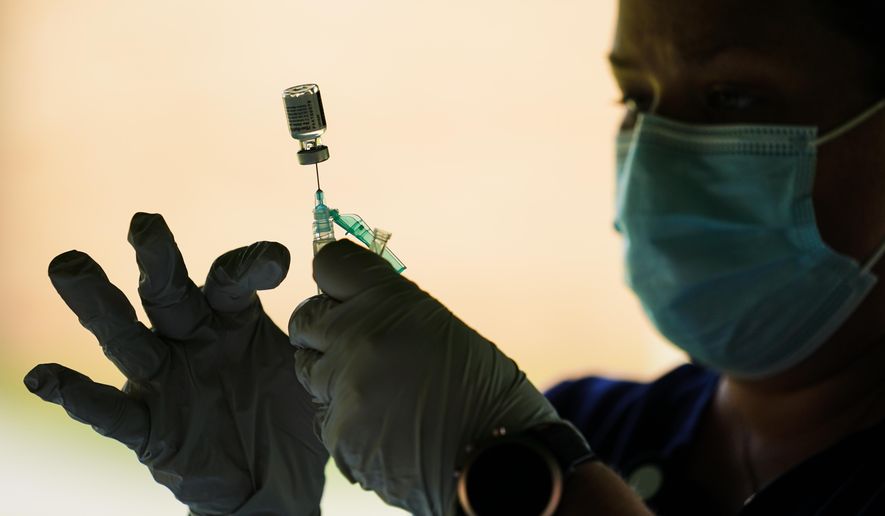The Food and Drug Administration on Friday approved COVID-19 booster shots from Pfizer-BioNTech and Moderna for all adults, opening a new chapter in the vaccine rollout and allowing the Biden administration to catch up to states that advised residents to seek an extra dose regardless of eligibility.
Senior regulators said they want to act quickly to backfill waning immunity and streamline rules that began to splinter across the country.
“Throughout the course of the COVID-19 pandemic, the FDA has worked to make timely public health decisions as the pandemic evolves,” acting FDA Commissioner Janet Woodcock said. “Authorizing the use of a single booster dose of either the Moderna or Pfizer-BioNTech COVID-19 vaccine for individuals 18 years of age and older helps to provide continued protection against COVID-19, including the serious consequences that can occur, such as hospitalization and death.”
The FDA authorizations arrive as cases are starting to rise on the cusp of the holiday shopping and travel season. Scientists are particularly worried that older persons will see bad outcomes from COVID-19 because they tend to be furthest from their initial vaccine series.
Regulators decided to bypass an advisory committee that pumped the brakes on widespread boosters in September.
A separate panel that advises the Centers for Disease Control and Prevention said Friday that persons over 18 “may” get the boosters and those over age 50 “should” get a booster.
SEE ALSO: Maryland expands booster shot eligibility to all adults
Both recommendations were approved in an 11-0 vote.
CDC Director Rochelle Walensky accepted those recommendations late Friday, clearing the way for the booster rollout to widen significantly by the weekend.
California Gov. Gavin Newsom, a Democrat who already recommended boosters for all, called the FDA announcement “great news for the rest of the country” on the cusp of the holidays.
“Make sure to keep your immunity up and protect yourself and your loved ones,” he tweeted. “Get your booster.”
President Biden has pushed to provide booster shots to all Americans since August when he saw data from Israel showing the antibody response provided by initial vaccination tends to wane after six months. He is fighting the pandemic on two fronts, using mandates to draw in over 60 million eligible Americans who haven’t come forward for any doses, while offering extra doses to people who got vaccinated first.
How far the shots have waned varies depending on who is studied, including their age and where they live, and how far out they are from their initial vaccinations. But effectiveness against symptomatic infection has generally dropped to between 40% to 70%, while protection against hospitalization and death is typically at least 80%.
SEE ALSO: EU reviewing Pfizer’s COVID antiviral pill for emergency use
Pfizer based its request for widespread boosters on data from a trial involving 10,000 people in the U.S., Brazil and South Africa with a median age of 53 and who completed a two-dose series with the Pfizer vaccine. During the study, there were five cases of symptomatic COVID-19 disease in the booster group and 109 cases in the non-booster group, for a relative efficacy of 95%.
CDC presenters said it is unclear how much impact the booster program will have on reducing viral transmission, beyond thwarting COVID-19 disease in individuals. However, they said any reduction in infection and onward spread will be helpful during the winter months.
Moderna said at midweek that its booster shots were approved for all adults in many international markets.
Previously, booster shots of messenger-RNA vaccines from Pfizer and Moderna were available to seniors, people with underlying health conditions and those who worked in high-risk jobs.
People who received the one-shot Johnson & Johnson vaccine are eligible for a booster shot of any vaccine if they received their J&J dose at least two months ago.
U.S. adults seeking a booster can select one from any of the three vaccines, regardless of the brand they received in their initial vaccine series.
Many states were frustrated with the patchwork of eligibility rules and urged people to go out and seek a booster if they wanted one, a remarkable end-run around the federal process.
There was little to stand in their way, however. Pharmacies generally rely on self-attestation in giving the shots, and the Biden administration has openly pushed for widespread boosters since August.
About 31 million Americans, or 16% of the fully vaccinated, have sought out a booster so far, according to federal data.
Peter Marks, director of the FDA’s Center for Biologics Evaluation and Research, said the new approvals will “help to eliminate confusion about who may receive a booster dose and ensure booster doses are available to all who may need one.”
Some governors, including Michelle Lujan Grisham of New Mexico and Ned Lamont of Connecticut, have said boosters should be incorporated into the definition of what it means to be “fully vaccinated.”
White House Press Secretary Jen Psaki pointed to CDC guidance that says a person is considered fully vaccinated 14 days after one shot of the J&J version or the second dose of the Pfizer and Moderna versions.
“That has not changed,” she said “That’s what we continue to follow and that’s what we would advise others to follow around the country.”
For more information, visit The Washington Times COVID-19 resource page.
• Tom Howell Jr. can be reached at thowell@washingtontimes.com.




Please read our comment policy before commenting.